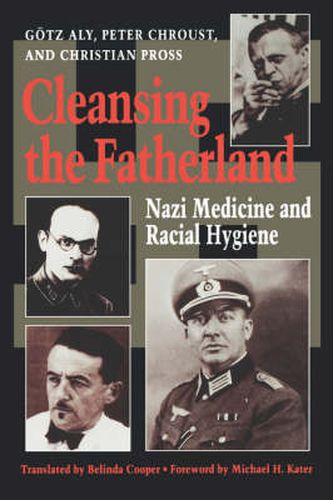Readings Newsletter
Become a Readings Member to make your shopping experience even easier.
Sign in or sign up for free!
You’re not far away from qualifying for FREE standard shipping within Australia
You’ve qualified for FREE standard shipping within Australia
The cart is loading…






The infamous Nuremberg Doctors’ Trials of 1946-47 revealed horrifying crimes - ranging from grotesque medical experiments on humans to mass murder - committed by physicians and other health care workers in Nazi Germany. But far more common, argue the authors of Cleansing the Fatherland , were the doctors who profited professionally and financially from the killings but were never called to task - and, indeed, were actively shielded by colleagues in postwar German medical organizations. The authors examine the role of German physicians in such infamous operations as the T4 euthanasia programme (code-named for the Berlin address of its headquarters at Number 4 Tiergartenstrasse). They also reveal details of countless lesser known killings - all ordered by doctors and all in the name of public health. Maladjusted adolescents, the handicapped, foreign labourers too ill to work, even German civilians who suffered mental breakdowns after air raids were selected for treatment . (One physician who persisted in speaking of killings was officially reprimanded for his negative attitude ). The book also includes original documents - never before published in English - that give unique and chilling insights into the everyday workings of Nazi medicine. Among them: minutes from a 1940 meeting of the Conference of German Mayors, at which a Nazi official give the assembled politicians detailed instructions for the secret burial of murdered mental patients; the diary of Dr. Hermann Voss, chief anatomist at the Reichs University of Posen (and later a highly respected physician in postwar Germany), who delights in the flowers blooming outside his window and worries that the overstock of Polish cadavers from his Gestapo suppliers might cause his crematory oven to break down; letters of Dr. Friedrich Mennecke, director of the notorious Eichberg Clinic, who writes with cloying sentimentality to the wife he calls mommy and comments offhandedly about visiting concentration camps to select patients for death. Today, as reports of mass death in Europe are once again cast in terms of public hygiene, and doctor assisted suicide is advocated - even applauded - on US television, the relevance of what Michael H. Kater here calls the lessons of the Third Reich is perhaps greater than ever.
$9.00 standard shipping within Australia
FREE standard shipping within Australia for orders over $100.00
Express & International shipping calculated at checkout
The infamous Nuremberg Doctors’ Trials of 1946-47 revealed horrifying crimes - ranging from grotesque medical experiments on humans to mass murder - committed by physicians and other health care workers in Nazi Germany. But far more common, argue the authors of Cleansing the Fatherland , were the doctors who profited professionally and financially from the killings but were never called to task - and, indeed, were actively shielded by colleagues in postwar German medical organizations. The authors examine the role of German physicians in such infamous operations as the T4 euthanasia programme (code-named for the Berlin address of its headquarters at Number 4 Tiergartenstrasse). They also reveal details of countless lesser known killings - all ordered by doctors and all in the name of public health. Maladjusted adolescents, the handicapped, foreign labourers too ill to work, even German civilians who suffered mental breakdowns after air raids were selected for treatment . (One physician who persisted in speaking of killings was officially reprimanded for his negative attitude ). The book also includes original documents - never before published in English - that give unique and chilling insights into the everyday workings of Nazi medicine. Among them: minutes from a 1940 meeting of the Conference of German Mayors, at which a Nazi official give the assembled politicians detailed instructions for the secret burial of murdered mental patients; the diary of Dr. Hermann Voss, chief anatomist at the Reichs University of Posen (and later a highly respected physician in postwar Germany), who delights in the flowers blooming outside his window and worries that the overstock of Polish cadavers from his Gestapo suppliers might cause his crematory oven to break down; letters of Dr. Friedrich Mennecke, director of the notorious Eichberg Clinic, who writes with cloying sentimentality to the wife he calls mommy and comments offhandedly about visiting concentration camps to select patients for death. Today, as reports of mass death in Europe are once again cast in terms of public hygiene, and doctor assisted suicide is advocated - even applauded - on US television, the relevance of what Michael H. Kater here calls the lessons of the Third Reich is perhaps greater than ever.